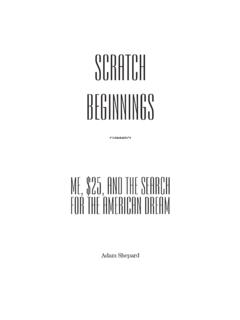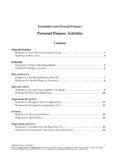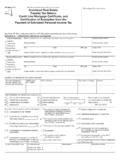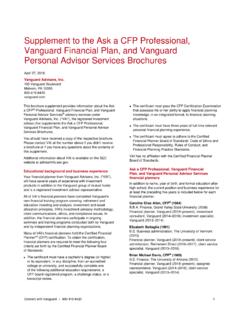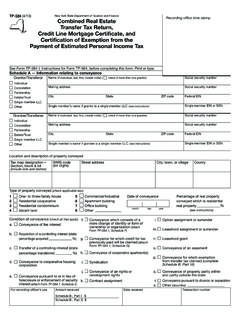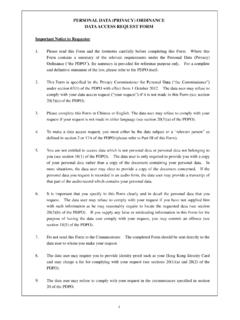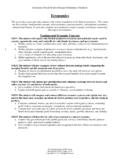Transcription of One Page Guide to Personal Finance - Get Rich Slowly
1 The One-Page Guide to Personal Finance The Three-Step Budget (Andrew Tobias, The Only Investment Guide You ll Ever Need). 1. Destroy all your credit cards. 2. Invest 20% of all that you earn. Never touch it. 3. Live on the remaining 80%, no matter what. The All Your Worth Budget (Elizabeth Warren, All Your Worth). 50% to Needs (taxes, groceries, shelter, insurance, utilities, basic clothing). 30% to Wants (extra clothes, restaurant meals, video games, knitting supplies, vacations). 20% to Savings (including debt repayment). The 60% Solution (Richard Jenkins, MSN Money). 60% to Committed Expenses (taxes, food, shelter, insurance, utilities, clothing). 10% to Irregular Expenses (vacations, medical bills, repairs, appliances). 10% to Long-Term Savings or Debt (student loans, credit cards, saving for a car, down payment for a house). 10% to Retirement (401k or Roth IRA). 10% to Fun (whatever you want to spend it on). The Get rich Slowly Guide to Roth IRAs Four Great Personal Finance Books for Recent Graduates The Money Book for the Young, Fabulous, and Broke by Suze Orman Debt is Slavery by Michael Mihalik Brazen Careerist by Penelope Trunk The Random Walk Guide to Investing by Burton Malkiel Four Great Personal Finance Sites for Recent Graduates Get rich Slowly ( ).
2 I Will Teach You to Be rich ( ). The Simple Dollar ( ). Money 101 ( ). Eight Guidelines for Managing Your Money Spend less than you earn. Track every penny you spend. Avoid debt. Avoid debt. Avoid debt. Pay yourself first. Before you pay your bills, before you buy groceries, before you do anything else, set aside X% of your income. (20% is good.). The perfect is the enemy of the good. Don t worry about getting things exactly right. Choose a good option and do something. If you can only save 5%, then save 5%. Action beats inaction. Do what works for you. Each person is different. What works for one person may not work for another. There s no one right way to save or to invest or to pay off debt or to buy a house. Take it slow. The most successful people are those who work longest and hardest at something they love to do. They don t get there overnight. Be patient and enjoy the journey. Failure is okay. We learn from failure. What really sucks is not trying at all.
3 It s better to have tried and failed than to never have tried. Use failure to learn how to do it better next time. Money is more about mind than it is about math. We all understand the math. Stay happy and in control of your life, and money will be easier to manage. It s more important to be happy than it is to be rich . But money gives you more options in life. by Roth of Get rich Slowly ( ).
